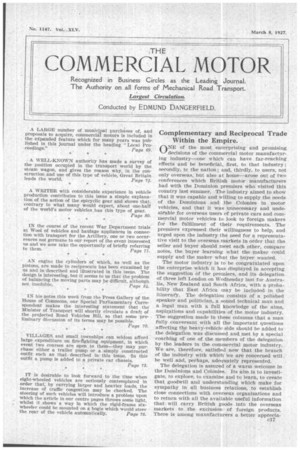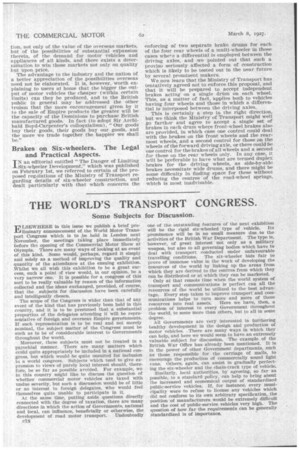Complementary and Reciprocal Trade Within the Empire.
Page 39

Page 40

If you've noticed an error in this article please click here to report it so we can fix it.
CINE of the most enterprising and promising decisions of the commercial motor manufactur ing industry—one which can have far-reaching effects and be beneficial, first, to that industry ; secondly, tc the nation ; and, thirdly, to users, not only overseas, but also at home—arose out of two conferences which British motor manufacturers had with the Dominion premiers who visited this country last summer. The industry aimed to show that it was capable and willing to supply the needs of the Dominions and the Colonies in motor vehicles, and that it was unnecessary and undesiea,ble for overseas users of private cars and commercial motor vehicles to look to foreign makers for the fulfilment of their requirements. The premiers expressed their willingness to help, and urged upon the industry the need for a representative visit to the overseas markets in order that the seller and buyer should meet each other, compare notes, the, buyer learning what the maker could supply and the maker what the buyer wanted.
The motor industry is to be congratulated upon the enterprise which it has displayed in accepting the suggestion of the premiers, and its delegation of three left London on Wednesday last for Australia, New Zealand and South Africa, with a probability that East Africa may be included in the itineraey. The delegation consists of a polished speaker and politician, a sound technical man and a legal man with a full knowledge of the aims, aspkations and capabilities of the motor industry. The suggestion made in these columns that a man fully conversant with all the important questions affecting the heavy-vehicle side should be added to the delegation was discussed and met by a special • coaching of one of the members of the delegation by the leaders in the commercial motor industry. We are, therefore, satisfied now that the branch of the industry with which we are concerned will be well and, perhaps, adequately represented.
The delegation is assured of a warm welcome in the Domlnions and' Colonies. Its aim is to investigate, to explore, to examine and to learn, to create that goodwill and understanding which make for sympathy in all business relations, to establish close connections with overseas organizations and to return with all the available useful information that will carry British goods into the overseas markets to the exclusion of foreign products. There is among manufacturers a better apprecia tion, not only of the value of the overseas markets, but of the possibilities of substantial expansion therein, of the dernatid for motor vehicles and appliances of all kinds, and there exists a determination to win those markets not only on quality but upon price.
The advantage to the industry and the nation of a better appreciation of the .possibilities overseas need not be elaborated. It is, however, worth explaining to users at home that the bigger the output of motor vehicles the cheaper (within certain limits) can they be produced, and to the British public in general may be addressed the other truism that the more encouragement given by it to the sale of Empire products the greater will he the capacity of the Dominions to purchase British manufactured goods. In fact (to adopt Sir Archibald Boyd-Carpenter's colloquialisM), "Our goods buy their goods, their goods buy our goods, and the more we trade together the happier we shall be."
Brakes on Six-wheelers. The Legal and Practical Aspects.
TN an editorial entitled " The Danger of Limiting -I-Six-wheeler Development," which was published on February 1st, we referred to certain of the proposed regulations of the Ministry of Transport regarding details of six-wheeler construction, and dealt particularly with that which concerns the enforcing GI two separate brake drums for each of the four rear wheels of a multi-wheeler in those eases whee-e a differential is employed between the driving axles, and, we pointed out that such a proviso seriously affected a form of construction which is likely to be tested out in the near future by several prominent makers.
We now learn that the Ministry of Transport has tentatively agreed not to enforce this proposal, and that it will be prepared to accept independent brakes acting on a single drum on each wheel. This as a matter of fact, Applies both to vehicles having four wheels and those in which a differential is interposed between the driving axles.
This is certainly a step in the right direction, but we think the Ministry of Transport might well go farther and agree to accept a single set of brakes in each drum where front-wheel brakes also are provided, in which case one control could deal with the brakes on the front wheels and the rearmost wheels, and a second control for those on the wheels of the forward driving axle, or there could be one control for the brakes of all wheels and a second for those on the rear wheels only. In any case, it will be preferable to have what are termed duplex brakes for the driving wheels, asside-by-side brakes necessitate wide drums, and there might be some difficulty In finding space for these without reducing the centres of the road-wheel springs, which is most inadvisable.












































































































